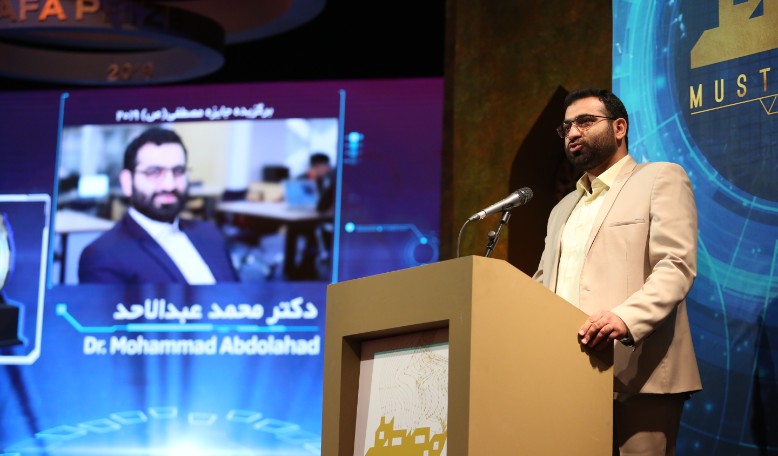Tensile stress can trigger cancerous growth of breast cells


A 2019 Mustafa(Pbuh) Prize laureate presented the latest findings of his research team on breast cancer during the 16th congress on Stem Cell Biology and Technology.
MSTF Media reports:
Mohammad Abdolahad, as a keynote speaker in Royan Institute's international congress held virtually on 2-6 September, 2020, delineated the effect of tensile stress on biological organs such as breasts.
He stated that some types of tensile stress such as “breastfeeding, long-time bra tightening, tissue expanders after mastectomy or other types of surgery, and some kinds of radiological procedures such as mammography” may induce tensile stretch for long time in preneoplastic and hyperplastic breast cells.
“These may induce some changes in the phenotypes of such breast cells as we investigated in our research,” he said
He and his research team have produced a mechanical stretcher with the assistance of some mechanical screw.
“About 15% of tensile stretch for 12 hours was continuously applied on some mammary epithelial breast cell lines ranging from normal breast cells (tumor zero) to invasive breast cancer cells,” he continued.
He said that some types of biological assays were done to investigate and evaluate the probable effect of tensile stress on the phenotype changing in breast cells.
According to Abdolahad, after about 38 hours of continuous tensile stress, significant increase in migratory capacity of post-stretched cells and a quick filling on stretched regions by normal and noninvasive malignant cells were observed.
“We think that producing and inducing tensile stretch increase the migratory functions in such types of cells,” he said.
Another investigation they have conducted to prove the effect of tensile stress on changing the phenotype of breast cells was measuring the Membrane Potential.
“After inducing tensile stretch in normal types of breast cells, a drastic reduction in Membrane Potential of such cells was observed, and a lower decrease was observed in invasive types of cancerous cells,” he contended.
Showing a video clip of cell behaviors as evidence, he concluded that inducing tensile stress and stretch in normal cells would increase their invasion properties against normal endothelial cells.
“As we investigated, inducing tensile stretch increases the invasive behavior of normal and noninvasive malignant breast cells to malignant and invasive malignant behavior,” he added.
Abdolahad posited that changing the invading phenotypes in both normal and malignant cells were increased after reducing stretch.
“This means some type of entering into stem cell behavior. As we know, cancerous behavior is some type of non-mature stem cell behavior. Invading to endothelial layer was observed in the post-stretched breast cell lines,” he added.
He also remarked that cancer-associated and invasion-associated proteins were all increased in post-stretch breast cells (either normal or cancerous types), and the ratio of non-cancerous proteins was decreased in these types of cells after being stretched by their mechanical tensile stress.
Abdolahad maintained that many mechanisms might be behind such significant changing phenotypes after inducing tensile stretch in breast cells.
“The metabolism mechanism might be one of the most important factors behind such changes,” he stressed.
According to Abdolahad, “hyperplastic cells and tumor cells, even in the presence of oxygen, change the metabolism to Aerobic Glycolysis.”
“We thought that Aerobic Glycolysis may be the main mechanism behind changes in phenotype of breast cells after being stretched by our mechanical system,” he observed.
He said that by examining 3 gene expression pathways—HRAS, Caveolin-1,and MnSOD—they concluded that “Aerobic Glycolysis, Lactic Acid production, and finally Acidosis may have the main role behind the phenotype changes in breast cell after being stretched by their mechanical system.”
“Stretching stimulation may activate some types of glycolysis-related pathways in cancer cells,” he added.
“In our new research, we are investigating the effect of such stress on drug resistance of these cells,” he announced.
Abdolahad said “we predict that the stretched cells and post-stretched cells may show much drug resistance to antimitotic drugs.”
He concluded that “mechanical stretch and some types of natural stretch we experience due to our lifestyle and habits, may induce some types of glycolytic activation in breast cells and enter the breast cells from normal types to cancerous phenotypes and invasive phenotypes.”
Mohammad Abdolahad, faculty member of School of Electrical and Computer Engineering at University of Tehran, was awarded the 2019 Mustafa Prize for his outstanding achievement in Translating the Behavior of Healthy and Cancerous Cells into the Electronic Field (New Methods in Diagnosis of Cancer).